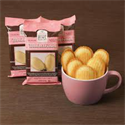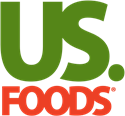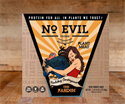Companies
Bakery Debuts Line Of Clean Label Minicakes
 Family-owned California bakery Sugar Bowl Bakery has launched a line of clean label miniature “Button Cakes” in four flavors. The minicakes are made with butter and eggs, contain real fruit and vanilla bean seeds, but no artificial flavors, colors or preservatives. The Button Cakes – available in tropical mango, wild blueberry, lemon zest and madagascar vanilla flavors – will be sold in eight- and 16-count packages in retail stores throughout the U.S. They were introduced at the recent International Dairy Deli Bakery Association Show in New Orleans, La.
Family-owned California bakery Sugar Bowl Bakery has launched a line of clean label miniature “Button Cakes” in four flavors. The minicakes are made with butter and eggs, contain real fruit and vanilla bean seeds, but no artificial flavors, colors or preservatives. The Button Cakes – available in tropical mango, wild blueberry, lemon zest and madagascar vanilla flavors – will be sold in eight- and 16-count packages in retail stores throughout the U.S. They were introduced at the recent International Dairy Deli Bakery Association Show in New Orleans, La.
Company Expands Production Facilities As Demand For Plant-Based Meats Soars
 Responding to what it calls “surging demand for its meat-free burgers,” California’s Beyond Meat, which produces Beyond Burger and Beyond Sausage, is opening a second factory in Columbia, Mo., that will add 250 jobs to its operations in the state. The new plant will expand production capacity from 30,000 sq. ft. to 100,000. Beyond Burger, launched in 2016, is made entirely from plants without GMOs, soy, or gluten. The Beyond Sausage line was launched late in 2017. The company has customers in Europe, Canada, Australia, Mexico, Chile, Israel, UAE, South Korea, Taiwan, and South Africa.
Responding to what it calls “surging demand for its meat-free burgers,” California’s Beyond Meat, which produces Beyond Burger and Beyond Sausage, is opening a second factory in Columbia, Mo., that will add 250 jobs to its operations in the state. The new plant will expand production capacity from 30,000 sq. ft. to 100,000. Beyond Burger, launched in 2016, is made entirely from plants without GMOs, soy, or gluten. The Beyond Sausage line was launched late in 2017. The company has customers in Europe, Canada, Australia, Mexico, Chile, Israel, UAE, South Korea, Taiwan, and South Africa.
Half Of Americans Worry About Health Impact Of GMO Ingredients
![]() Research from the International Food Information Council shows that labels proposed by the USDA’s Agricultural Marketing Service to disclose “bioengineered” (BE) foods “dramatically increase a wide variety of consumer concerns.” The IFIC Foundation tested reactions to the three BE labeling symbols and two variations of text disclosures. Consumers were shown bottles of canola oil without any BE logo or text, with symbols (like a “plant”), with a symbol plus “bioengineered” in text, and with a symbol plus “may be bioengineered” in text. Half of the consumers had “human health concerns” when shown the BE “plant” symbol. The number rose to 51 percent when text was added to indicate that the product was “bioengineered,” and to 57 percent when “may be bioengineered” was added to the “plant” symbol.
Research from the International Food Information Council shows that labels proposed by the USDA’s Agricultural Marketing Service to disclose “bioengineered” (BE) foods “dramatically increase a wide variety of consumer concerns.” The IFIC Foundation tested reactions to the three BE labeling symbols and two variations of text disclosures. Consumers were shown bottles of canola oil without any BE logo or text, with symbols (like a “plant”), with a symbol plus “bioengineered” in text, and with a symbol plus “may be bioengineered” in text. Half of the consumers had “human health concerns” when shown the BE “plant” symbol. The number rose to 51 percent when text was added to indicate that the product was “bioengineered,” and to 57 percent when “may be bioengineered” was added to the “plant” symbol.
Israeli Firm Develops Flavor Agent To Replace MSG
 Israeli food company Salt of the Earth has replaced flavoring ingredient monosodium glutamate (MSG) in its ranch dressing with an all-natural sodium-reduction ingredient based on vegetable extracts and sea salt. Mediterranean Umami was tested in many ranch dressing formulations. The tests resulted in a compound that maintained the true flavor of Ranch dressing, but with 30 percent less sodium, and no MSG or yeast extracts. According to the company, MSG leads to “Chinese restaurant syndrome,” a group of symptoms now known as MSG Symptom Complex. They can include headache, skin flushing, and sweating. Mediterranean Umami does not trigger side-effects and is a clean-label product evoking no negative consumer health reactions, the company says.
Israeli food company Salt of the Earth has replaced flavoring ingredient monosodium glutamate (MSG) in its ranch dressing with an all-natural sodium-reduction ingredient based on vegetable extracts and sea salt. Mediterranean Umami was tested in many ranch dressing formulations. The tests resulted in a compound that maintained the true flavor of Ranch dressing, but with 30 percent less sodium, and no MSG or yeast extracts. According to the company, MSG leads to “Chinese restaurant syndrome,” a group of symptoms now known as MSG Symptom Complex. They can include headache, skin flushing, and sweating. Mediterranean Umami does not trigger side-effects and is a clean-label product evoking no negative consumer health reactions, the company says.
Sales Growth Of Natural, Organic Foods Outpaces Industry
 The SPINS data service for the organic products industry finds that natural food and beverage sales growth is outpacing growth for conventional foods nationally. Some of the differences in sales growth are “striking,” the company said. For the year ending May 20, sales growth was nine percent, compared to 0.6 percent for the food industry overall. In the Mid-South, overall food product growth was only 1.7 percent, but nine percent for natural food and beverages. Market penetration of natural foods and beverages varies by region: 13.1 percent of the market in California, but only 5.5 percent in the four-state South Central region (Texas, Louisiana, Oklahoma and Arkansas). SPINS said the fast-rising consumer demand is prompting major conventional grocery chains to “raise their good food game,” and is putting pressure on other competitors.
The SPINS data service for the organic products industry finds that natural food and beverage sales growth is outpacing growth for conventional foods nationally. Some of the differences in sales growth are “striking,” the company said. For the year ending May 20, sales growth was nine percent, compared to 0.6 percent for the food industry overall. In the Mid-South, overall food product growth was only 1.7 percent, but nine percent for natural food and beverages. Market penetration of natural foods and beverages varies by region: 13.1 percent of the market in California, but only 5.5 percent in the four-state South Central region (Texas, Louisiana, Oklahoma and Arkansas). SPINS said the fast-rising consumer demand is prompting major conventional grocery chains to “raise their good food game,” and is putting pressure on other competitors.
US Foods Reformulates Product Lines With Clean Label In Mind
 Foodservice distributor US Foods Holding Corp. has reformulated its entire line of Metro Deli, Rykoff Sexton, Chef's Line, and Stock Yards Exclusive Brand products to create “clean label” profiles for its restaurant and foodservice customers. The move, a part of its “Unpronounceable List” initiative, was designed to offer products with simple recognizable ingredients by avoiding, removing or replacing more than 80 listed ingredients from 1,000 Exclusive Brand products. These ingredients include artificial flavors, artificial (FD&C) colors, high-fructose corn syrup, disodium guanylate, sodium benzoate, and monosodium glutamate. According to the company’s data, 46 percent of Millennials would be more likely to buy a product with no artificial ingredients.
Foodservice distributor US Foods Holding Corp. has reformulated its entire line of Metro Deli, Rykoff Sexton, Chef's Line, and Stock Yards Exclusive Brand products to create “clean label” profiles for its restaurant and foodservice customers. The move, a part of its “Unpronounceable List” initiative, was designed to offer products with simple recognizable ingredients by avoiding, removing or replacing more than 80 listed ingredients from 1,000 Exclusive Brand products. These ingredients include artificial flavors, artificial (FD&C) colors, high-fructose corn syrup, disodium guanylate, sodium benzoate, and monosodium glutamate. According to the company’s data, 46 percent of Millennials would be more likely to buy a product with no artificial ingredients.
Mock-Meats Maker Says Its Products Are Strictly Clean Label
 Ashville, N.C.-based start-up No Evil Foods hopes to differentiate itself from makers of “mock-meats” that use highly-processed ingredients and protein isolates. The company has applied clean label principles to the production of plant-based meat products that are small batch and sustainable. Instead of isolated proteins, the company uses a chickpea and European wheat flour base that is texturized and seasoned to make four products. The portfolio includes Comrade Cluck vegan chicken, a chorizo sausage, an Italian sausage that comes in links, and smoked pulled pork barbeque. The mock-meats are very low fat – they contain no added fats or oils – are cholesterol free, and protein-rich.
Ashville, N.C.-based start-up No Evil Foods hopes to differentiate itself from makers of “mock-meats” that use highly-processed ingredients and protein isolates. The company has applied clean label principles to the production of plant-based meat products that are small batch and sustainable. Instead of isolated proteins, the company uses a chickpea and European wheat flour base that is texturized and seasoned to make four products. The portfolio includes Comrade Cluck vegan chicken, a chorizo sausage, an Italian sausage that comes in links, and smoked pulled pork barbeque. The mock-meats are very low fat – they contain no added fats or oils – are cholesterol free, and protein-rich.

